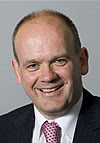
The Mayor appeared before Thursday's budget committee and used the opportunity to announce his fares package for the coming year. This naturally overshadowed the rest of the business which covered budget plans for the Fire Authority and the London Development Agency.
Fares Package
Boris announced a fares increase of inflation plus 1% on average, although this will vary with some ticket types rising by less. He claims that this rise is needed to fix a 'black hole' left in the budget by the previous incumbent, although there were claims from other members that some of his new policies were adding the extra costs. I'm inclined to give the Mayor the benefit of the doubt for several reasons:
1. Changing this organisation is like turning a super tanker. Boris has only just started to bring in his policies so any costs incurred will be minimal. The TfL representative confirmed that new policies had not been considered when planning this fares package.
2. Livingstone had previous form. Four years ago he promised fare cuts before the election then put them up several months after he had won. History is repeating itself.
3. During the election correspondence from TfL emerged, showing that officials were concerned about the gap they had identified in the Livingstone's budget.
4. Livingstone in fact agreed the inflation plus 1% increase at a TfL board meeting which he chaired before the election. He then changed his decision as the election approached, causing consternation at TfL.
There are a lot of claims and counter claims being made, so I was pleased that the Mayor responded positively to my request that TfL's advice to his predecessor be released to committee members so we can see exactly who decided what, and when.
Meanwhile, there was good news on the 24 hour Freedom Pass, now due to go live with the new fares package in January. The cut price fares for claimants on income support have also been maintained, despite speculation that they would be abolished along with the Venezuela oil deal.
Fire Authority
Chairman Brian Coleman provided a typically assertive performance, telling the committee that he was aiming for zero growth in his budget. It will be challenging to turn around a settlement which has relied on raiding the reserves in recent years, but he had some interesting ideas, including the sharing of corporate functions with other GLA functional bodies - always possible since the creation of the GLA, but never before seen as a priority -, a review of training services, and plans to move the Fire Brigade Museum to a more accessible location.
Brian undertook to maintain the number of front line fire fighters and appliances, indeed there are plans to open a new fire station in Havering, the first new fire station in many years.
The authority will also fund resilience costs - equipping us to respond to terrorist attacks - if the government refuse to provide the money, as they have in the past.
London Development Agency
The previously troubled LDA quickly came under new management and chief executive, Peter Rogers, made his first appearance before the committee. He is rightly keen to establish new priorities with his board before speculating in a public forum, but he did indicate that future funding would be focused on larger projects where the returns would be more reliable and the burden of monitoring would be eased.
We were pleased to hear that board meetings would be held in public, and that a standing public item would allow discussion of the Mayor's directions to the authority. This level of transparency was one of the key recommendations from Patience Wheatcroft's forensic audit which followed the new Mayor's election.
So, a lot of ground was covered in a couple of hours. The committee plans to monitor future activities of the functional bodies and also plans to do some stand alone reviews, including an informative look at the true costs of transport policing. It promises to be a full and interesting year.

No comments:
Post a Comment